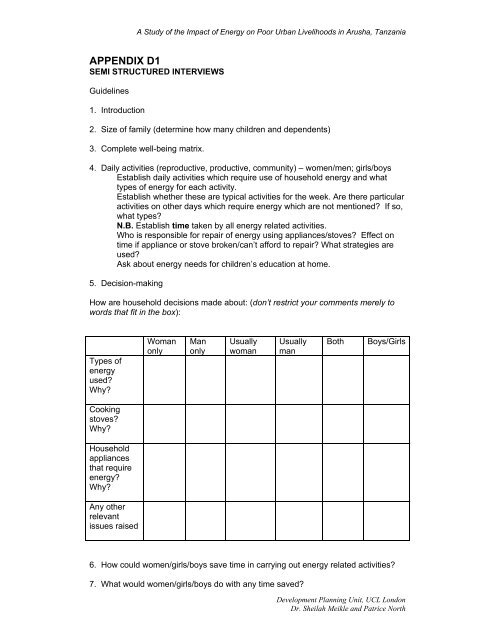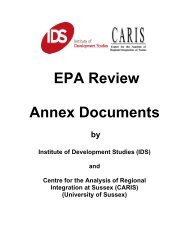The Impact of Energy Use on Poor Urban Livelihoods in ... - DfID
The Impact of Energy Use on Poor Urban Livelihoods in ... - DfID
The Impact of Energy Use on Poor Urban Livelihoods in ... - DfID
Create successful ePaper yourself
Turn your PDF publications into a flip-book with our unique Google optimized e-Paper software.
A Study <str<strong>on</strong>g>of</str<strong>on</strong>g> the <str<strong>on</strong>g>Impact</str<strong>on</strong>g> <str<strong>on</strong>g>of</str<strong>on</strong>g> <str<strong>on</strong>g>Energy</str<strong>on</strong>g> <strong>on</strong> <strong>Poor</strong> <strong>Urban</strong> <strong>Livelihoods</strong> <strong>in</strong> Arusha, Tanzania<br />
APPENDIX D1<br />
SEMI STRUCTURED INTERVIEWS<br />
Guidel<strong>in</strong>es<br />
1. Introducti<strong>on</strong><br />
2. Size <str<strong>on</strong>g>of</str<strong>on</strong>g> family (determ<strong>in</strong>e how many children and dependents)<br />
3. Complete well-be<strong>in</strong>g matrix.<br />
4. Daily activities (reproductive, productive, community) – women/men; girls/boys<br />
Establish daily activities which require use <str<strong>on</strong>g>of</str<strong>on</strong>g> household energy and what<br />
types <str<strong>on</strong>g>of</str<strong>on</strong>g> energy for each activity.<br />
Establish whether these are typical activities for the week. Are there particular<br />
activities <strong>on</strong> other days which require energy which are not menti<strong>on</strong>ed? If so,<br />
what types?<br />
N.B. Establish time taken by all energy related activities.<br />
Who is resp<strong>on</strong>sible for repair <str<strong>on</strong>g>of</str<strong>on</strong>g> energy us<strong>in</strong>g appliances/stoves? Effect <strong>on</strong><br />
time if appliance or stove broken/can’t afford to repair? What strategies are<br />
used?<br />
Ask about energy needs for children’s educati<strong>on</strong> at home.<br />
5. Decisi<strong>on</strong>-mak<strong>in</strong>g<br />
How are household decisi<strong>on</strong>s made about: (d<strong>on</strong>’t restrict your comments merely to<br />
words that fit <strong>in</strong> the box):<br />
Types <str<strong>on</strong>g>of</str<strong>on</strong>g><br />
energy<br />
used?<br />
Why?<br />
Cook<strong>in</strong>g<br />
stoves?<br />
Why?<br />
Household<br />
appliances<br />
that require<br />
energy?<br />
Why?<br />
Any other<br />
relevant<br />
issues raised<br />
Woman<br />
<strong>on</strong>ly<br />
Man<br />
<strong>on</strong>ly<br />
Usually<br />
woman<br />
Usually<br />
man<br />
Both Boys/Girls<br />
6. How could women/girls/boys save time <strong>in</strong> carry<strong>in</strong>g out energy related activities?<br />
7. What would women/girls/boys do with any time saved?<br />
Development Plann<strong>in</strong>g Unit, UCL L<strong>on</strong>d<strong>on</strong><br />
Dr. Sheilah Meikle and Patrice North
















